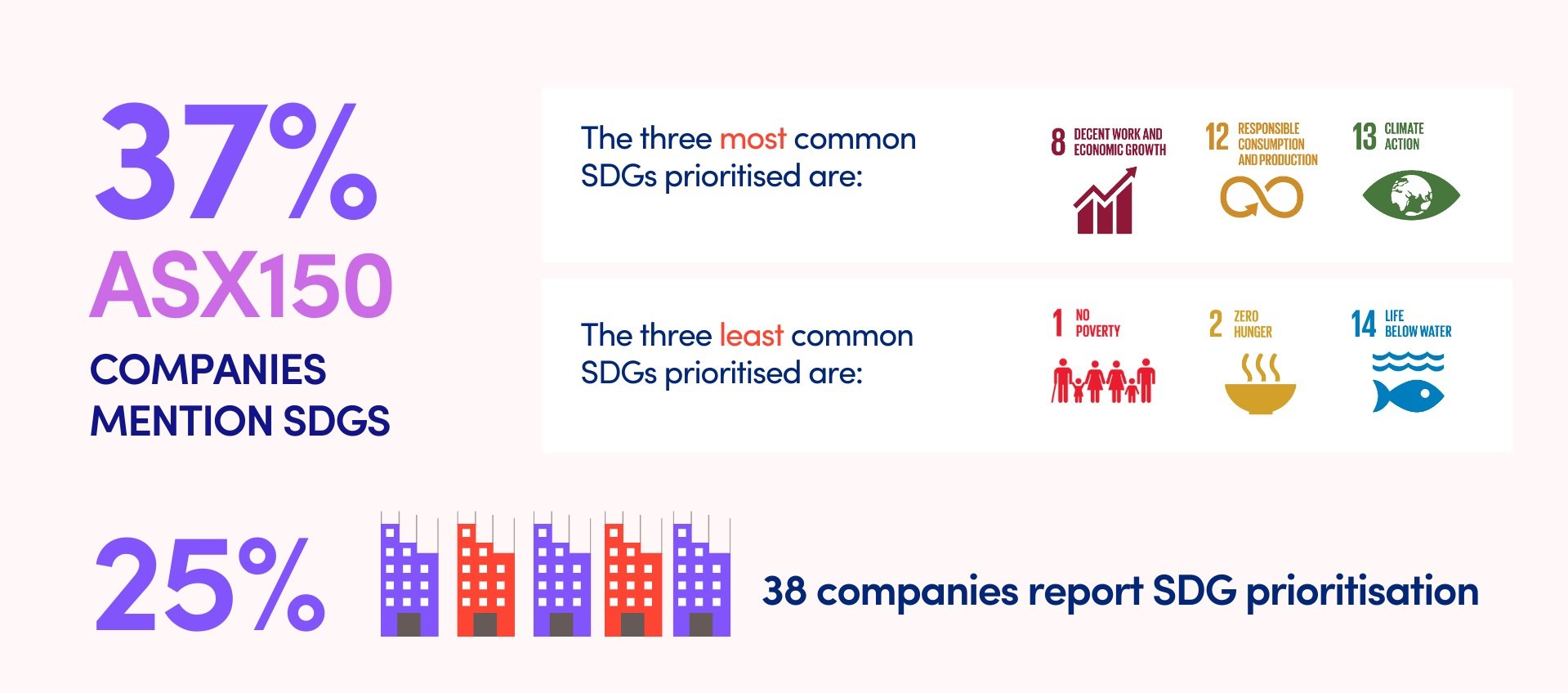The Australian sustainability gap: companies vs. consumers
Australian consumers and Australia’s top publicly-listed companies (ASX 150) don’t see eye to eye when it comes to sustainability and the key issues affecting our future.
We discovered this perplexing fact when comparing our own proprietary research (on consumers) with a study by RMIT University and Global Compact Network Australia (ASX150).
Encouragingly, both consumers and companies have been taking action, ramping up sustainability efforts at speed.
However, each group’s priorities are poles apart.
In order to achieve the United Nations Sustainable Development Goals (SDGs), companies, governments and people need to align if we’re to meet the ambitious but critical targets.
Let’s start with consumer sentiment.
Consumer research findings
We conducted quantitative research, surveying 600 Australians during September 2019. The aim of the project was to identify the key issues on Australian minds.
We then mapped these issues back to the 17 SDGs, since they effectively each represent a pressing global challenge.
See below key findings rank as the top 4 issues most important to Australians:
education
jobs
health and
food
The choices made by respondents is consistent with 2019 the Australian federal election outcome; where despite predictions by political experts, the issues of climate change, gender equality and migration weren’t reflected in election results.
Interestingly, the top issues identified align with Maslow’s Hierarchy of Needs, which suggests people are firstly motivated by Physical needs (food, air, water, health) and then Security (safety, stability, shelter) before being motivated by other needs.
Gender and age filters did not change or alter the overall findings.
However, when adding personality traits like openness to the mix, Gender Equality moved up the scale, replacing Education within the top 4 issues that matter most to Australians:
Australian companies and sustainability goals
ASX 150 companies have contrasting priorities for consumers. Findings from our consumer research revealed only SDG8: Decent Work and Economic Growth aligned with the findings from the RMIT/GCNA study.
SDG1: No Poverty and SDG2: Zero Hunger were rated as the “least common corporate priorities” yet are a paramount to consumers according to our research.
The study also reported: 82% of ASX 150 companies failed to disclose integration of the SDGs into their strategies.
Only 17 companies (11%) mention SDGs in the letters by either the Chair or CEO.
Globally, PwC reported: 72% of companies were self-reporting SDGs measurement across their sustainability efforts – using SDGs as the sustainability measurement standard.
Source: Executive Summary Report: SDG Measurement & Disclosure by ASX150. For more details see http://www.unglobalcompact.org.au/new/wp-content/uploads/2019/08/2019.08_SDG_Summary_Report_compressed.pdf
It has been well-documented we now live in a customer-first world, and in turn, this poses ongoing existential challenges to businesses.
Surely this should be enough reason to listen to consumers and align with their priorities.
Government intervention to close the sustainability gap?
There is much at stake so we encourage the Federal Government to embrace the sustainability agenda and win hearts and minds in the process. We believe the government can deliver win-win outcomes for both today’s stakeholders and well as future generations:
"Sustainable development can be interpreted in economic terms as “development that lasts” (Pearce and Barbier, 2000) – i.e. a path along which the maximisation of human well-being for today’s generations does not lead to declines in future well-being."
Aligning groups brings challenges.
Previous local approaches have resulted in death by committees and or policy paralysis. Whereas international examples like the Danish government has shown leadership and conviction in recent times - aiming to reduce emissions by 70% by 2030.
Equally, China’s electric vehicle plans show marked improvements.
In contrast, the following are recent comments from the Australian Prime Minister’s office:
"I have an old fashioned view that business should act honestly and within the law, provide the best possible product or service, and maximise return to their shareholders."
"So instruct your public affairs units. Instead of pretending you love paying tax or that you’re building electric cars rather than mining coal, or are in the solar panel rather than the oil or gas business, tell your employees and the quiet Australians in their communities – what you can do for them."
Shaping sustainability strategies is not easy, like herding cats in many instances.
History will ultimately judge the brave and not so brave.
Failure to align may ultimately result in material economic downturn, along with leaving the planet in a far worse place.
Regardless of where you sit on the political spectrum – left or right – success is achievable.
The Danish government and other international examples provide hope of what’s possible when we all work together – as consumers, corporates and the government.




